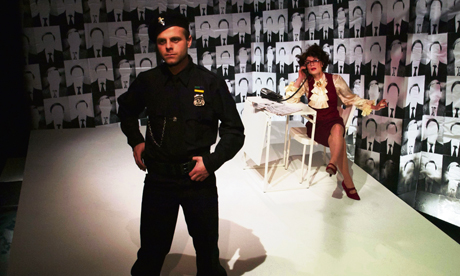Count Oederland

Count Oederland: the play initially caused riots and is still banned in Paris as a result
Despite being a critically celebrated figure, the late Swiss dramatist Max Frisch has never been a regular on the London stage, and many of his works have languished in the theatrical hinterland. This month, however, a Frisch play never previously performed on these shores makes its way to the Arcola in Dalston, transferring from a successful run at the White Bear.
Director Christopher Loscher first came across Count Oederland while doing research in the British Library, and immediately became enamoured with the play. Translated into English by Michael Bullock, it follows a bank clerk whose private act of revolt fuels a violent, anarchic, axe-wielding movement, the goals of which are at best unclear. Although featured on Kenneth Tynan’s famous list of texts suitable for production at the National Theatre, the drama, which premiered in 1951, has since been largely neglected.
It’s not hard to see why. The play courted controversy in its early adaptations, causing riots in various European cities, and is still banned in Paris as a result. As Loscher explains, Frisch doesn’t answer the big questions for the audience, giving equal weight to either side of the moral debate. A play which depicts seemingly senseless revolt as a viable and perhaps necessary action was seen as a dangerous device, perhaps even more so in England, a country which has generally abandoned revolution in favour of a genteel and gradual evolution.
Yet the events of the past few months have proven Count Oederland to be an oddly relevant work, and comparisons to the current political climate are hard to ward off. Initially commissioned as part of a season on revolution in the wake of the Arab Spring, the play has become increasingly pertinent as the August riots spread across London and angry mobs took to the streets in cities around the globe.
This context has created an arena for Frisch’s play to emerge as a prescient tale for contemporary society. “The (UK) riots were very much without politics”, says Loscher. “They didn’t have a necessary aim or goal, but there was a feeling of something being not quite right – people who felt constrained. For me that had a lot of relevance with the play and I think it will for a lot of others.”
Count Oederland
Tuesday 10 – Saturday 21 January 2012
7.30 pm, (2.30pm matinees 14th and 21st)
Arcola Theatre
020 7503 1646
£18 (£12 concessions)
